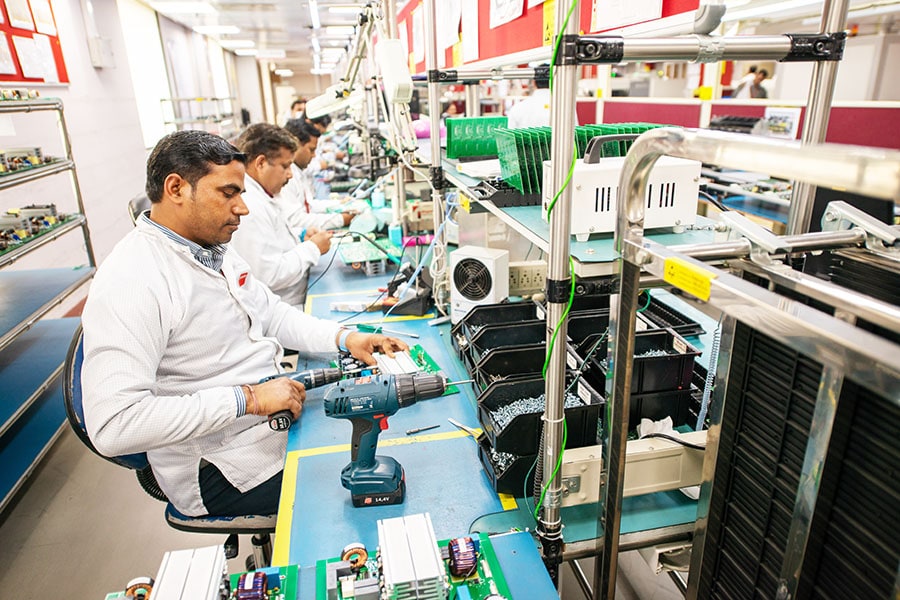
Budget 2023: Higher spending on job creation
By Mansvini Kaushik| Feb 1, 2023
Skilling, apprenticeship programmes part of measures to ensure youth are equipped to meet the demands of future employment
 [CAPTION]The government plans to set up 30 Skill India International Centres to ensure job creation under the Pradhan Mantri Kaushal Vikas Yojana (PMKVY). Image Credit: Pradeep Gaurs / Shutterstock[/CAPTION]
[CAPTION]The government plans to set up 30 Skill India International Centres to ensure job creation under the Pradhan Mantri Kaushal Vikas Yojana (PMKVY). Image Credit: Pradeep Gaurs / Shutterstock[/CAPTION]
Stating that the capital investment outlay would be increased by 33 percent to Rs 10 lakh crore, which would be 3.3 percent of the GDP, Finance Minister Nirmala Sitharaman said, “The budget makes the need once again to ramp up the virtuous cycle of investment and job creation.” The outlay is almost three times that of 2019-20 and Sitharaman added that the substantial increase in recent years is central to the government’s efforts to enhance growth potential and job creation, crowding in private investments, and providing a cushion against global headwinds.
The unemployment rate as on 19 December 2022, based on The Centre for Monitoring Indian Economy’s (CMIE) data, stood at 9 percent on a 30-day moving average basis, up from 6.5 percent in January 2022.
_RSS_ The minister said that the “government aims to skill lakhs of youth for over three years with enabled demand-based skilling and sector-specific skilling i.e. they will be trained with skills that are relevant in the industry."
To this end, Sitharaman said that the government plans to set up 30 Skill India International Centres to ensure job creation under the Pradhan Mantri Kaushal Vikas Yojana (PMKVY), The centres will focus on skills including coding, artificial intelligence, robotics, mechatronics, Internet of Things (IoT), and 3D printing drones, among others.
“By prioritizing PMKVY 4.0, skill development, job creation, and industry-aligned curriculum, the country's youthful workforce will be equipped with the skills necessary to meet the demands of future employment. This will seamlessly bridge the divide between education and employment opportunities,” said Dr Shuchi Gautam, I/C Director, Thakur Global Business School, Mumbai.
Also read: Budget 2023: Economic Survey projects decade of sustained growth
Krishna Kumar, CEO, Learnbay, an online training platform agrees. “The step would significantly open up job opportunities and catalyse growth across industries such as finance, telecommunications, healthcare, manufacturing, and e-commerce, among others. This would also address the current industrial talent crunch with a new tech-enabled populace,” he said.
Sitharaman also announced the National Apprenticeship Promotion Scheme. This will provide stipend support to 47 lakh youth over three years. “A Direct Benefit Transfer under a pan-India National Apprenticeship Promotion Scheme will be rolled out,” she stated. “The three-year plan to support 47 lakh youths and a special focus on futuristic technology like AI shows the government is aiming for a long-term sustainable skill development rather than short cited one,” said Alex George, chairman and managing director of IT company ITLH (Information Technology Learning Hub).
Madhushree Sekher, Dean, School of Vocational Education, Tata Institute of Social Sciences, welcomed the announcements. "We embrace the emphasis in this Union Budget 2023 on cultivating skills as per the National Education Policy and economic initiatives aimed at generating employment opportunities for the younger generation,” she said, adding, “The nationwide apprenticeship programme and the PM Kaushal Vikas Yojana 4.0 will empower and inspire countless young people to sharpen their abilities for more promising career prospects.”
To empower the youth and help the ‘Amit Peedi’, as Sitharaman put it, the National Education Policy 2020 has “focused on skilling, adopted economic policies that facilitate job creation at scale, and have supported business opportunities.” Sitharaman announced that in the next three years, the Centre will recruit 38,800 teachers and support staff for the 740 Eklavya Model Residential Schools.
Along with multiple welfare schemes, the budget speech also focussed on raising capital spending on the construction of schools, bridges, and other infrastructure. “There is a continued focus on creating jobs, investing in education and skilling that will truly help leverage our demographic dividend, push the green growth agenda, incentivise manufacturing and ensure that the most marginalised communities feel included,” said Sanjeev Krishan, chairperson, PwC in India.
Saahil Goel, co-founder & CEO of Shiprocket, an e-commerce logistics and software solutions provider, added that the two most important priorities as listed by the finance minister are to ‘unleash potential’ and actualise the ‘youth power’. “The announcement of a support stipend for the youth would also have a great impact on them. The special emphasis on capitalising on the massive potential of India’s youth through skill development schemes would surely lead to a positive growth trajectory for the GDP,” he said.